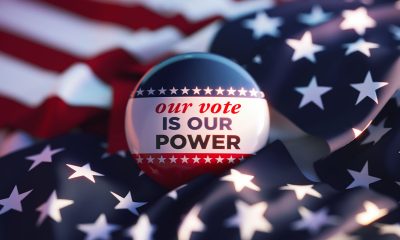National
1st Racial-Impact Law Seen as Having Modest Effect in Iowa

In this Tuesday, Jan. 13, 2015 photo, former state Rep. Wayne Ford sits in his Urban Dreams offices, in Des Moines, Iowa. (AP Photo)
RYAN J. FOLEY, Associated Press
IOWA CITY, Iowa (AP) — After a 2007 report showed that Iowa had the nation’s highest disparity for sending blacks to prison, state lawmakers took a novel step: They passed a law requiring analysts to draft “racial-impact statements” on any proposals to create new crimes or tougher penalties.
The governor at the time said the statements would be “an essential tool” to understand how minority communities might be affected before any votes are cast.
A review by The Associated Press shows that the first-in-the-nation law appears to be having a modest effect, helping to defeat some legislation that could have exacerbated disparities and providing a smoother path to passage for measures deemed neutral or beneficial to minorities.
Since Iowa acted, similar proposals have been adopted in Connecticut and Oregon. And more are likely to surface this year in several states.
Supporters say the idea can improve public trust at a time when many Americans question the fairness of the justice system and prevent policies that have unintended racial consequences. Critics are concerned that it unfairly injects race into policymaking and potentially weakens public safety. And a researcher who helps draft the statements said the analysis can involve some guesswork.
But there has been little analysis of how the laws actually work once passed. Iowa’s experience provides the richest data available.
A review of 61 Iowa impact statements issued since 2009 showed that only 6 out of 26 bills seen as having a disproportionate effect on minorities passed both chambers and became law. Meanwhile, bills that were rated as having no effect or a positive effect on minority incarceration rates were nearly twice as likely to pass. Fourteen out of 35 such proposals became law.
The precise effect of the statements is impossible to gauge since many factors, including cost and lobbying pressure, contribute to whether a bill becomes law. But legislators say any warning that a law could send more minorities to prison or for longer sentences affects their debates.
“It’s made a difference already here in Iowa,” said former Rep. Wayne Ford, a Des Moines Democrat who wrote the law and is advising lawmakers across the country on similar legislation. “There is no doubt in my mind that what we started years ago has begun a movement, with Ferguson and all the public safety issues that we’ve got now.”
An example arose last year when lawmakers considered a bill to extend the crime of interference with official acts to anyone who resists jail guards. At first, it seemed like an uncontroversial proposal to close a legal loophole. Police, correctional officers and municipalities lined up in support. But the plan died in a committee after analysts warned that 35 percent of those who commit the new crime would probably be minorities.
In a state that is 88 percent white, the heightened focus on race irritates some critics.
“What we have done is take the blindfold off of lady justice,” said Republican Rep. Clel Baudler, a retired state trooper who leads the public safety committee. “A crime is a crime is a crime.”
The statements are drafted by the Legislative Services Agency using data on the prison population, arrests, convictions and sentences broken down by race. The agency has found disproportionate racial effects in proposals to increase penalties for child kidnappers, pimps who bring minors into prostitution and suspects who elude police officers, among others.
Senior legislative analyst Beth Lenstra acknowledged that analysts are sometimes “kind of guessing” how a new crime would affect minorities using data from similar existing offenses. But she said the studies lead to a more informed debate.
Marc Mauer, director of the Sentencing Project, a nonprofit that pushes for criminal justice system changes, called the AP’s findings “intriguing.”
“We need to be a little cautious about interpreting that, but nonetheless, it’s a fairly substantial difference right off the bat,” said Mauer, whose 2007 report found Iowa blacks were 13 times more likely than whites to be incarcerated.
Mauer promoted racial-impact statements in a 2007 law journal article and worked with Ford to pass Iowa’s law. His group hosted a two-day strategy session in August with supporters seeking to require racial-impact statements in several states, including Wisconsin and Arkansas.
Mauer said the measures “aren’t going to change the world,” noting that they do not affect laws already on the books, but they promote fairness.
The AP’s findings are in line with a 2013 study by researchers at Simpson College, who concluded that Iowa’s law has had a neutral effect on the prison population but may have a greater impact in coming years. With 2,130 blacks behind bars this month, they still make up 26 percent of the prison population and just 3 percent of Iowa residents.
Rep. Chip Baltimore, an Iowa Republican who heads the judiciary committee, said the statements were of little value since they do not consider the root causes of the racial disparity. But he said they offered political cover to lawmakers who oppose legislation for other reasons.
“I think at times it becomes a political tool,” he said. “There are some legislators that if it has any minority impact, they won’t vote for it.”
Copyright 2015 The Associated Press. All rights reserved. This material may not be published, broadcast, rewritten or redistributed.
Activism
Oakland Post: Week of December 31, 2025 – January 6, 2026
The printed Weekly Edition of the Oakland Post: Week of – December 31, 2025 – January 6, 2026

To enlarge your view of this issue, use the slider, magnifying glass icon or full page icon in the lower right corner of the browser window.
Activism
2025 in Review: Seven Questions for Assemblymember Lori Wilson — Advocate for Equity, the Environment, and More
Her rise has also included several historic firsts: she is the only Black woman ever appointed to lead the influential Assembly Transportation Committee, and the first freshman legislator elected Chair of the California Legislative Black Caucus. She has also been a vocal advocate for vulnerable communities, becoming the first California legislator to publicly discuss being the parent of a transgender child — an act of visibility that has helped advanced representation at a time when political tensions related to social issues and culture have intensified.

By Edward Henderson, California Black Media
Assemblymember Lori D. Wilson (D-Suisun City) joined the California Legislature in 2022 after making history as Solano County’s first Black female mayor, bringing with her a track record of fiscal discipline, community investment, and inclusive leadership.
She represents the state’s 11th Assembly District, which spans Solano County and portions of Contra Costa and Sacramento Counties.
Her rise has also included several historic firsts: she is the only Black woman ever appointed to lead the influential Assembly Transportation Committee, and the first freshman legislator elected Chair of the California Legislative Black Caucus. She has also been a vocal advocate for vulnerable communities, becoming the first California legislator to publicly discuss being the parent of a transgender child — an act of visibility that has helped advanced representation at a time when political tensions related to social issues and culture have intensified.
California Black Media spoke with Wilson about her successes and disappointments this year and her outlook for 2026.
What stands out as your most important achievement this year?
Getting SB 237 passed in the Assembly. I had the opportunity to co-lead a diverse workgroup of colleagues, spanning a wide range of ideological perspectives on environmental issues.
How did your leadership contribute to improving the lives of Black Californians this year?
The Black Caucus concentrated on the Road to Repair package and prioritized passing a crucial bill that remained incomplete during my time as chair, which establishes a process for identifying descendants of enslaved people for benefit eligibility.
What frustrated you the most this year?
The lack of progress made on getting Prop 4 funds allocated to socially disadvantaged farmers. This delay has real consequences. These farmers have been waiting for essential support that was promised. Watching the process stall, despite the clear need and clear intent of the voters, has been deeply frustrating and reinforces how much work remains to make our systems more responsive and equitable.
What inspired you the most this year?
The resilience of Californians persists despite the unprecedented attacks from the federal government. Watching people stay engaged, hopeful, and determined reminded me why this work matters and why we must continue to protect the rights of every community in our state.
What is one lesson you learned this year that will inform your decision-making next year?
As a legislator, I have the authority to demand answers to my questions — and accept nothing less. That clarity has strengthened my approach to oversight and accountability.
In one word, what is the biggest challenge Black Californians are facing currently?
Affordability and access to quality educational opportunities.
What is the goal you want to achieve most in 2026?
Advance my legislative agenda despite a complex budget environment. The needs across our communities are real, and even in a tight fiscal year, I’m committed to moving forward policies that strengthen safety, expand opportunity, and improve quality of life for the people I represent.
Activism
2025 in Review: Seven Questions for Assemblymember Tina McKinnor, Champion of Reparations, Housing and Workers’ Rights
In 2025, McKinnor pushed forward legislation on renters’ protections, re-entry programs, reparations legislation, and efforts to support Inglewood Unified School District. She spoke with California Black Media about the past year and her work. Here are her responses.

By Joe W. Bowers Jr., California Black Media
Assemblymember Tina McKinnor (D-Inglewood) represents
California’s 61st Assembly District.
As a member of the California Legislative Black Caucus (CLBC),
McKinnor was elected in 2022. She chairs the Los Angeles County Legislative Delegation and leads the Assembly Public Employment and Retirement Committee. McKinnor also served as a civic engagement director, managed political campaigns, and worked as chief of staff for former Assemblymembers Steven Bradford and Autumn Burke.
In 2025, McKinnor pushed forward legislation on renters’ protections, re-entry programs, reparations legislation, and efforts to support Inglewood Unified School District. She spoke with California Black Media about the past year and her work. Here are her responses.
Looking back on 2025, what do you see as your biggest win?
Assembly Bill (AB) 628. If rent is $3,000, people should at least have a stove and a refrigerator. It’s ridiculous that people were renting without basic appliances.
I’m also proud that I was able to secure $8.4 million in the state budget for people coming home from incarceration. That includes the Homecoming Project, the menopause program for incarcerated women, and the Justice Leaders Program.
How did your leadership help make life better for Black Californians this year?
After the Eaton Fire, I pushed to get the same kind of support for affected areas that wealthier regions get after disasters.
I also did a lot of work building political power— establishing the Black Legacy PAC and California for All of Us PAC so we could support Black candidates and educate voters. We also called voters to make sure they understood Prop 50.
People need to understand this: there are only 12 Black legislators in the Capitol. Folks act like we can just walk in and pass reparations, but that’s not how it works.
What frustrated you most this year?
The governor did not have the political will to sign these bills: AB 57 and AB 62. They both passed overwhelmingly in the Assembly and the Senate. We did the work. The only person who didn’t have the political will to sign them was the governor.
The public needs to ask the governor why he didn’t sign the bills. We can’t keep letting people off the hook. He has to answer.
I also introduced AB 51 — the bill to eliminate interest payments on Inglewood Unified School District’s long-standing state loan — held in the Appropriations Committee. That was frustrating,
What inspired you most in 2025?
The civil rights trip to Alabama was life changing. We visited the Legacy Museum and the National Memorial for Peace and Justice. We took members of the Black, Latino, Jewish, and API caucuses with us. It changed all of us.
People aren’t always against us — they just don’t know our history.
What’s one lesson from 2025 that will shape how you approach decisions next year?
The legislative trip to Norway taught me that collaboration matters. Government, labor, and industry sit down together there. They don’t make villains. Everybody doesn’t get everything they want, but they solve problems.
What’s the biggest challenge facing Black Californians in one word?
Inequity. It shows up in housing, wealth, stress – all these things.
What’s the number one goal you want to accomplish in 2026?
Bringing back AB 57 and AB 62, and securing money for the Inglewood Unified loan interest forgiveness.
-

 Activism3 weeks ago
Activism3 weeks agoDesmond Gumbs — Visionary Founder, Mentor, and Builder of Opportunity
-

 Activism3 weeks ago
Activism3 weeks agoFamilies Across the U.S. Are Facing an ‘Affordability Crisis,’ Says United Way Bay Area
-

 Alameda County3 weeks ago
Alameda County3 weeks agoOakland Council Expands Citywide Security Cameras Despite Major Opposition
-

 Alameda County3 weeks ago
Alameda County3 weeks agoBling It On: Holiday Lights Brighten Dark Nights All Around the Bay
-

 Activism3 weeks ago
Activism3 weeks agoBlack Arts Movement Business District Named New Cultural District in California
-

 Activism3 weeks ago
Activism3 weeks agoLu Lu’s House is Not Just Toying Around with the Community
-

 Activism4 weeks ago
Activism4 weeks agoOakland Post: Week of December 17 – 23, 2025
-

 Black History2 weeks ago
Black History2 weeks agoAlfred Cralle: Inventor of the Ice Cream Scoop





















































